
Journal of Hydrology and Hydromechanics
Scope & Guideline
Unlocking the secrets of hydrology and engineering.
Introduction
Aims and Scopes
- Hydrological Modelling and Simulation:
Research that develops and evaluates models simulating hydrological processes, including rainfall-runoff relationships, soil moisture dynamics, and watershed management. - Soil and Water Interaction Studies:
Investigations into the physical and chemical properties of soils as they relate to water retention, infiltration, and hydrological response, including the effects of land use and management practices. - Hydraulic Engineering and Water Management:
Studies focused on the design and analysis of hydraulic structures, flow resistance, sediment transport, and the impact of various engineering interventions on water systems. - Ecohydrology and Biogeochemical Cycles:
Research integrating ecological and hydrological dynamics, including the role of vegetation and soil biota in water cycles and the implications for ecosystem services. - Climate Change and Hydrological Effects:
Examinations of how climate variability and change influence hydrological processes, water availability, and flood/drought occurrences. - Innovative Measurement and Monitoring Techniques:
Development and application of new technologies and methodologies for measuring hydrological parameters, including remote sensing and in-situ monitoring.
Trending and Emerging
- Impact of Climate Change on Hydrology:
There is a growing focus on how climate change affects hydrological cycles, including altered precipitation patterns, increased flooding, and drought risk assessments. - Machine Learning and Data-Driven Approaches:
The use of machine learning techniques for hydrological modeling, including predictive analytics and uncertainty quantification, is emerging as a significant trend in recent research. - Integrated Water Resource Management (IWRM):
Research emphasizing the holistic management of water resources, considering social, economic, and environmental factors, is increasingly prominent, reflecting a shift towards sustainable practices. - Soil and Water Conservation Practices:
Emerging studies are focusing on innovative practices for soil and water conservation, particularly in agricultural contexts, to enhance resilience against climate variability. - Biochar and Soil Amendments:
Increasing interest in the role of biochar and other soil amendments in improving soil hydrophysical properties and enhancing water retention capabilities is evident in recent studies. - Remote Sensing and Advanced Monitoring Techniques:
The application of remote sensing technologies for real-time monitoring of hydrological processes and land use changes is a rapidly growing area of research.
Declining or Waning
- Traditional Soil Erosion Studies:
Research specifically focused on conventional soil erosion mechanisms appears to be waning, as more integrated approaches considering vegetation and land management practices are becoming prevalent. - Static Hydrological Parameter Studies:
Studies that focus solely on static parameters without considering dynamic interactions within hydrological systems are becoming less common, as there is a growing emphasis on real-time data and adaptive management. - Single-Factor Analyses:
Research that examines single factors affecting hydrology, such as only precipitation or only land use, is declining in favor of multi-factor analyses that consider the complex interplay of various environmental variables. - Laboratory-Only Studies:
While laboratory studies are still important, there is a noticeable shift towards field-based research and modeling that incorporates real-world complexities, reducing the emphasis on purely controlled experimental setups.
Similar Journals

JOURNAL OF HYDROMETEOROLOGY
Exploring the Frontiers of Atmospheric ResearchJOURNAL OF HYDROMETEOROLOGY, published by the American Meteorological Society, is a leading scholarly journal that serves as a vital resource within the field of atmospheric science. With its ISSN 1525-755X and E-ISSN 1525-7541, this journal provides a platform for the dissemination of high-impact research, currently holding a prestigious Q1 ranking in Atmospheric Science as per the 2023 Category Quartiles. It enjoys an excellent reputation, ranked #30 out of 148 in the Scopus listings, placing it in the top 80th percentile within Earth and Planetary Sciences. Publishing rigorous and innovative studies from 2000 to 2024 and beyond, the journal addresses critical topics including weather forecasting, climate dynamics, and hydrological processes, making it essential reading for researchers, professionals, and students alike. Though not an open-access journal, it continues to enrich the academic community with quality contributions dedicated to advancing our understanding of hydrometeorological phenomena.

Hydrologie und Wasserbewirtschaftung
Empowering voices in hydrology and water management.Hydrologie und Wasserbewirtschaftung, published by the BUNDESANSTALT GEWASSERKUNDE-BFG, stands as a vital open access journal in the field of hydrology and water management since its inception in 1999. Based in Germany, this journal aims to disseminate high-quality research related to water resources, environmental sustainability, and innovative management strategies. Though it has a Q4 ranking in Water Science and Technology for 2023, and holds a Scopus rank of 113 out of 225, the journal provides an essential platform for researchers, professionals, and students interested in advancing their understanding of water science. With coverage spanning from 1999 to 2018 and a seamless move to an open access model, Hydrologie und Wasserbewirtschaftung remains committed to contributing to the ongoing dialogue around critical water issues. Researchers looking to publish their findings or stay abreast of developments in water science will find this journal indispensable.
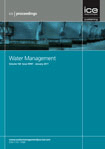
PROCEEDINGS OF THE INSTITUTION OF CIVIL ENGINEERS-WATER MANAGEMENT
Fostering Knowledge for Efficient Water Resource ManagementPROCEEDINGS OF THE INSTITUTION OF CIVIL ENGINEERS-WATER MANAGEMENT is a prestigious journal published by Emerald Group Publishing Ltd, dedicated to advancing the field of water management within civil engineering. With an ISSN of 1741-7589 and an E-ISSN of 1751-7729, this journal delivers peer-reviewed research that spans the critical intersections of water science and technology, contributing valuable insights into sustainable water management practices. As evidenced by its ranking in the 2023 Scopus categories, where it holds the Q3 quartile in Water Science and Technology, and a respectable position among its peers, the journal remains a vital resource for researchers, professionals, and students in the field. Though it is not an open-access journal, it offers accessible subscription options that facilitate worldwide dissemination of knowledge, enhancing its role as a fundamental reference point for cutting-edge developments in water management. For those looking to publish or stay updated on the latest research trends, this journal serves as an essential platform for promoting innovation and sustainable practices in civil engineering and water resources management.
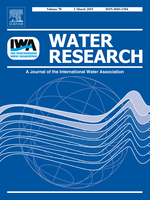
WATER RESEARCH
Advancing water science for a sustainable future.WATER RESEARCH, published by Pergamon-Elsevier Science Ltd, is a premier international journal dedicated to the advancement of knowledge in the interdisciplinary field of water science and technology. With a significant impact factor, WATER RESEARCH holds a distinguished position, consistently ranking in the top quartile (Q1) across multiple categories including Civil and Structural Engineering, Environmental Engineering, and Pollution. Established in 1967 and set to continue its legacy until at least 2024, this journal provides a vital platform for researchers and professionals to disseminate cutting-edge findings related to water sustainability, quality, and management. Although the journal follows a traditional access model, its commitment to disseminating impactful research ensures that it remains an essential resource for academia and industry alike. With a rigorous selection process, the journal includes articles that significantly contribute to the understanding and resolution of global water-related challenges, making it an invaluable asset for researchers, students, and practitioners engaged in this critical area of study.
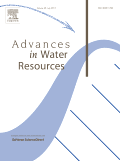
ADVANCES IN WATER RESOURCES
Bridging theory and practice in water resource research.ADVANCES IN WATER RESOURCES is a premier peer-reviewed journal published by Elsevier Science Ltd, dedicated to advancing the field of water science and technology since its inception in 1977. With an impressive Q1 ranking in the field, this journal provides a vital platform for researchers, professionals, and students to disseminate cutting-edge research that addresses critical issues related to water resources management, hydrology, and environmental sustainability. The journal offers a comprehensive collection of articles that explore innovative methodologies, policy implications, and case studies that shape the future of water resource management. Although it does not provide open access, its impactful contributions are recognized globally, making it an essential resource for anyone engaged in water science. The journal continues to publish relevant research while looking forward to bridging the gap between theoretical insights and practical applications up until 2024.
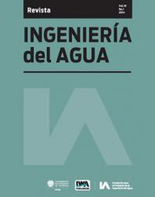
Ingenieria del Agua
Transforming Challenges into Opportunities in Water ManagementIngenieria del Agua, published by Universitat Politècnica de València, Editorial UPV, is a prominent open-access journal dedicated to the field of water engineering and management. With its ISSN 1134-2196 and E-ISSN 1886-4996, this journal has been facilitating the dissemination of critical research and innovative practices in water resources since 1994. With a commitment to providing unrestricted access to high-quality research, Ingenieria del Agua aims to serve as a pivotal platform for researchers, professionals, and students alike. Focused on the intersection of hydrology, environmental engineering, and sustainability, the journal encourages submissions that address contemporary challenges in water resource management, promoting advancements that are vital for both ecological conservation and societal needs. By fostering a collaborative academic environment, it plays an essential role in shaping the future of water engineering.
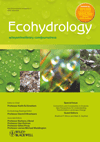
Ecohydrology
Pioneering Research in Ecohydrological DynamicsEcohydrology is a prestigious academic journal published by WILEY that focuses on the interplay between ecological and hydrological systems. With a robust ISSN of 1936-0584 and E-ISSN 1936-0592, it has established itself as a leading source in its field since its inception in 2009. Positioned in the top quartile (Q1) of various categories, including Aquatic Science, Earth-Surface Processes, and Ecology, the journal leverages its high impact factor to attract significant scholarly contributions. The recent rankings in Scopus place Ecohydrology among the top-tier journals, with notable percentile standings—79th in Ecology, Evolution, Behavior and Systematics, and 77th in both Aquatic Science and Environmental Science. Aimed at researchers, professionals, and students, the journal provides a vital platform for disseminating new insights and methodologies that address pressing environmental challenges. Despite not being an open-access journal, Ecohydrology offers a wealth of knowledge that is crucial for advancing our understanding of ecosystem dynamics and sustainable water resource management.

Meteorology Hydrology and Water Management-Research and Operational Applications
Empowering researchers and policymakers through cutting-edge insights.Meteorology Hydrology and Water Management - Research and Operational Applications is a prominent academic journal published by the Institute of Meteorology and Water Management, based in Warsaw, Poland. With a focus on advancing the understanding and application of meteorology, hydrology, and water resource management, this journal plays a crucial role in disseminating high-quality research that contributes to both theoretical knowledge and practical applications in these pivotal fields. Although it operates under traditional access options, the journal is dedicated to providing valuable insights and solutions to challenges faced by researchers, practitioners, and policymakers in water management and environmental studies. Researchers keen on exploring innovative methodologies, operational tools, and empirical studies will find this journal an essential resource in enhancing their work and understanding of the dynamic interplay between meteorological phenomena and water resource management. The journal's commitment to maintaining rigorous scholarly standards ensures that every publication drives impactful dialogues within the community and beyond.
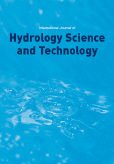
International Journal of Hydrology Science and Technology
Pioneering Research at the Intersection of Hydrology and TechnologyThe International Journal of Hydrology Science and Technology, published by InderScience Enterprises Ltd, is a distinguished platform dedicated to advancing knowledge in the field of hydrology, environmental engineering, and water science. With an ISSN of 2042-7808 and an E-ISSN of 2042-7816, this journal, established in 2011 and continuing through 2024, serves as an essential resource for researchers, professionals, and students alike. Despite being categorized in the Q3 quartile across multiple disciplines including Earth and Planetary Sciences, Environmental Engineering, Waste Management and Disposal, and Water Science and Technology, the journal maintains a reputation for contributing significant findings that impact both theory and practical applications in addressing hydrological challenges. Currently unavailable through Open Access options, the journal remains committed to disseminating valuable research that informs sustainable practices in water resource management. The editorial team encourages submissions that explore innovative strategies and methodologies while fostering interdisciplinary discussions, making this journal a pivotal player in shaping the future of hydrological science.
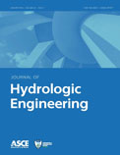
JOURNAL OF HYDROLOGIC ENGINEERING
Innovating Solutions for Water ChallengesJOURNAL OF HYDROLOGIC ENGINEERING is a premier academic journal published by the ASCE - American Society of Civil Engineers, dedicated to advancing the field of hydrologic engineering through the dissemination of innovative research and methodologies. With an ISSN of 1084-0699 and E-ISSN 1943-5584, this journal serves a global audience and has established itself as an essential resource for professionals, researchers, and students in the civil and environmental engineering disciplines. Currently ranked in the Q2 category across multiple areas including Civil and Structural Engineering and Water Science and Technology, the journal promotes high-quality, peer-reviewed articles that address critical challenges in hydrology, water resources, and environmental management. Despite not being an open-access journal, it offers valuable insights that drive progress in sustainable engineering practices. The convergence of research from 1996 to 2024 makes it an invaluable archive for historical and cutting-edge contributions to the field, reflecting its commitment to fostering knowledge and innovation in hydrologic engineering.